We support patient autonomy and work to protect patients from the imposition of other people's personal religious views.
There is widespread support amongst the public for a compassionate law that permits assisted dying under certain circumstances.
But religious lobbying exerts a disproportionate influence on the debate on assisted dying, frustrating much-needed reform.
Assisted dying (AD) is when a person chooses to be given help to die, usually because they are terminally ill and suffering unbearably.
AD is legal in a growing number of countries around the world. In all these jurisdictions there are strict guidelines and safeguards to ensure AD is not misused. Where AD is an option, it complements palliative care rather than replacing it.
AD is not explicitly legal anywhere in the UK. Terminally ill people who wish to end their suffering more quickly have very few options.
Travelling to a country where their death can be assisted legally isn't a viable option for most, due to the high expense and the difficulties in travelling with a terminal illness. What's more, friends and relatives who accompany or help someone travel abroad for AD may be prosecuted.
Terminally ill people in the UK may therefore resort to taking their own life, leading to botched suicides, or asking the help of loved ones. This puts friends and relatives in a horrendous position: either they must watch their loved one suffer, or they must help them die and risk jail in the process.
The largest poll ever conducted on assisted dying found 84% of people in Britain support a change in the law. This includes 82% of Christians and 90% of nonreligious people.
Many regard refusing people a final relief from unbearable suffering as a harmful act. But strong opposition to AD comes from religious leaders who think AD goes against the will of their gods.
We support the democratic right of all people to contribute to the debate on AD. But policy decisions should be guided by evidence, compassion and respect for the principle of patient autonomy, rather than religious dogma. The views of the general public, professionals and relevant organisations should be fairly reflected at policy level.
Within the National Secular Society, individual members hold a range of views about AD. All are agreed that religious privilege should have no place in the decision-making process.
Take action!
1. Write to your MP
Ask your MP to support properly regulated assisted dying.
2. Share your story
Tell us why you support this campaign, and how you are personally affected by the issue. You can also let us know if you would like assistance with a particular issue.
3. Join the National Secular Society
Become a member of the National Secular Society today! Together, we can separate religion and state for greater freedom and fairness.
Latest updates
NSS calls for action on high suicide rates among the terminally ill
Posted: Thu, 25 Aug 2022 09:05
The National Secular Society has urged the Scottish government to allow the choice of assisted dying in the wake of high suicide rates among the terminally ill.
In response to the Scottish government's consultation on suicide prevention, the NSS highlighted that recent figures from the Office for National Statistics suggest people with potentially terminal health conditions are more than twice as likely to take their own lives than the general population.
The NSS said allowing the option for people suffering intolerably from a terminal illness to control their death under proper medical supervision "will significantly reduce the number of suicides".
Helping a terminally ill patient who wishes to end their life is not currently a specific offence under Scots law but can be prosecuted as murder. The current law contains no safeguards to protect dying people who want to control their death. It also offers fewer protections to people who did not want to die but whose relatives later claim that they did.
It is widely acknowledged that even with the best available palliative care some people's suffering cannot be alleviated.
Eighty-six per cent of Scots believe the law regarding assisted dying needs to change. The NSS echoed this in its response, noting the law is "widely regarded as cruel and inhumane" and often leads to "botched suicides that cause immense pain and distress to both the individual and their family".
Research from Dignity in Dying estimates up to 650 terminally ill people a year in the UK are taking their own lives in lieu of a safe, legal option to die on their own terms, with up to 10 times as many attempts.
Prior to the Covid-19 pandemic, every eight days someone from the UK travelled to Dignitas for help to die. The process costs more than £10,000, rendering it too expensive for a huge proportion of Scots.
Marjorie Wallace CBE, chief executive of mental health charity SANE, has said traditional suicide prevention measures "are not an appropriate response" for those who are nearing the end of life and wish to ease the dying process, because their motivation is "to shorten death, not shorten life".
She has called for a change in the law on assisted dying so that terminally ill people "can explore their wishes fully and openly, access mental health support where necessary, and choose to be able to die on their own terms in safety and with protection".
The NSS warned strong opposition to assisted dying comes from religious leaders, and that the over-representation of religious groups imposes a "disproportionate level of influence" on the assisted dying debate. It said the views of the general public, professionals and relevant organisations "should be fairly reflected at policy level."
The NSS is also supporting Liam MacArthur MSP's proposed bill to enable legal assisted dying for terminally ill adults.
NSS: 'Terminally ill patients should not feel forced to resort to suicide'
NSS Campaigns Officer Alejandro Sanchez said: "The terminally ill must have a choice in how and when they die.
"These patients should not feel forced to resort to suicide, which often leads to a violent or deeply unpleasant death. The option of a medically-assisted, dignified assisted death must be open to them.
"For too long religious dogma has stood in the way of a compassionate and rigorously safeguarded assisted dying law. It is now overwhelmingly clear the people of Scotland demand and deserve change."
If you are struggling to cope, please call Samaritans for free on 116 123 or contact other sources of support, such as those listed on the NHS Help for suicidal thoughts webpages
Assisted dying debate: Most MPs back reform
Posted: Tue, 5 Jul 2022 14:41
The majority of MPs who spoke at a parliamentary debate supported reforming the law to allow the choice of assisted dying.
During the Westminster Hall debate yesterday, nearly twice as many MPs spoke in favour of legalising assisted dying for terminally ill, mentally competent adults as those opposed.
The National Secular Society, which supports bodily autonomy and works to protect patients from the imposition of other people's religious views, briefed all MPs prior to the debate.
The NSS asked MPs to help ensure religious teachings "are not imposed on the majority who support a more compassionate assisted dying law in the UK".
The debate was called after a petition sponsored by Dignity in Dying gained over 155,000 signatures in support of legalising assisted dying.
Former health secretary backs NSS statement
Evangelical Christian Stephen Timms (pictured) objected to the NSS's argument that opponents with religious objections to assisted dying disguise them with secular concerns, by exaggerating the risks and weaponising them to spread fear.
He said disabled people's organisations that legalising assisted dying "would be a deeply damaging change".
But former health secretary Matt Hancock, who supports a change in law, said: "I have heard that argument made a couple of times, and I respect the associations involved, but how would the right hon. Member reflect on the fact that, according to polls, 86% of people living with a disability are in favour of a change?"
He added that this percentage is greater than in the population as a whole (84%) and that he did "not understand the point he is making".
Edward Leigh, who is Catholic and also opposes abortion, said he wished to make a "theological point" against assisted dying and called on members to "try to take a pro-life view".
Leigh suggested legalising assisted dying would mean GPs would have the "burden" of questioning if they should "end it" for old people. Andy Slaughter criticised this as "appalling scaremongering".
Slaughter added: "This should not be a debate only between different attitudes, religious practices or medical treatments; it should be a debate about ensuring that the needs of the terminally ill are met in the most appropriate and compassionate way."
Christians in Parliament member Ian Paisley also invoked religion in his opposition to assisted dying, saying: "When we walked into this Chamber today, we walked under a portrait of Moses. That portrait carried with it a biblical and, indeed, faith inspiration that we can make good laws."
'In a liberal democracy, the religious views of some do not restrict the rights and freedom of others'
Other MPs echoed the NSS's concerns that religion should not determine policy on assisted dying.
Lucy Allan said: "I deeply respect the religious views of others on all subjects, and it is their right to express their views and live them out.
"However, in a liberal democracy, the religious views of some do not restrict the rights and freedom of others, and so it is with this issue."
Aaron Bell said: "I do respect the sincerity of people who make faith-based arguments here.
"However, many of us do not have faith. Increasingly, that is the case for many of our constituents. We can see that in the census."
He added that many people who are religious, including Wera Hobhouse who referred to her Christian faith in the debate, support assisted dying.
Hobhouse also expressed disappointment that that no time was given to debate Baroness Molly Meacher's assisted dying bill and that Conservative peers were whipped to vote against an assisted dying amendment to the Health and Care Act.
NSS supporter Ruth Cadbury said parliament is "too often behind the curve of public opinion", citing the laws on divorce, blasphemy and homosexuality and same-sex marriage as examples.
Responding on behalf of the government, under-secretary of state for justice James Cartlidge said if it became the clearly expressed will of parliament to legalise assisted dying, the government would ensure "that the relevant legislation was delivered as effectively as possible".
NSS: "Decisions around assisted dying should be based on evidence, compassion, and respect for patient autonomy"
NSS chief executive Stephen Evans said: "It is heartening to see the vast majority of MPs in this debate stand up for the principle that decisions around assisted dying should be based not on religious dogma, but on evidence, compassion, and respect for patient autonomy.
"The current legal position causes heart-rending suffering and provides dying adults with no choice or control over their death, with tragic consequences for dying people and their families.
"There is now overwhelming public support for the law to be reformed to enable assisted dying with robust legal safeguards. As is happening in an increasing number of jurisdictions around the world, legislation can be passed that will protect vulnerable people from pressure to end their lives, and support people to exercise their autonomy and end their suffering in a humane and dignified manner."




